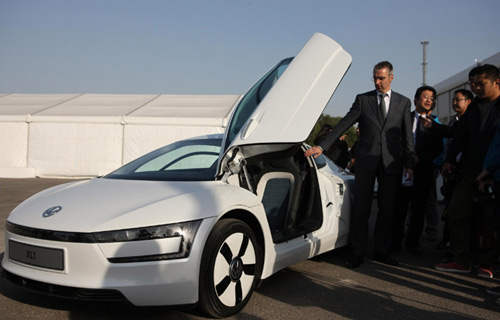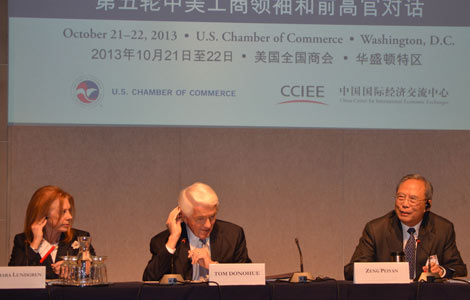Western China has top potential for opening
Updated: 2013-10-24 07:34
By Zheng Yangpeng and Li Yu in Chengdu (China Daily USA)
|
||||||||
Additional reforms offer the chance to make region more fully integrated with global trade, economy
Western China is where the largest potential for China's further opening up lies and various reforms should be implemented here to make the region more integrated with the rest of the world, Vice-Premier Wang Yang said at the opening of the 14th Western China International Fair.
"Our determination to prioritize the go west strategy will not waver. Our effort to open up the west region will not change or taper," Wang said on Wednesday, the first day of the five-day expo, which has brought together more than 4,000 enterprises all over the world.
To establish a more sound system for the region's opening-up, he said the government will reform its role in investment management, shifting from the current "directory management"- meaning foreign investors are only allowed to invest in areas that are listed in the directory - to a "negative list" management and giving registered foreign firms the same treatment as Chinese companies.
He also vowed to reform the outbound investment management system, making individuals and enterprises the "main actors" in outbound investment. The inland ports along China's western border will be developed and more bonded zones would be approved to facilitate foreign trade.
He underscored the great potential for the western region's opening-up, with the region now only contributing 6 percent of China's foreign trade despite the fact that it occupies 72 percent of the nation's land and 84 percent of the border.
Wang paid tribute to the "great achievement" after 14 years of the 'go west' campaign, especially in the areas of infrastructure and poverty reduction. The region's railway lines have been expanded to 37,000 kilometers and roads to 1.69 million km, of which 30,000 km are super highways. Ninety-four percent of the townships have built roads. Urban residents' income has doubled from the 1999 level.
Carlsberg Group, a well-known beer brand in the West, is one of the 1,720 foreign firms participating in the fair. It is betting on western China's huge market as people here get increasingly affluent.
"We see faster sales growth here than in other regions of the country," said Stephen Maher, chief executive officer of Carlsberg China. "As urbanization progresses and people get richer, they are looking for a better quality of life and more choices."
The robust growth has pushed the Denmark company to accelerate its investment in China. Following construction of a 5 billion yuan ($820 million) production base in Dali, in southwest Yunnan province, the single biggest investment by Carlsberg in China, it signed another deal of two capacity-expanding projects in Liangzhou and Yibin in Sichuan. Total investment will amount to around 500 million yuan by the time they are finished.
Asked if China's slower growth is a problem, Maher said: "The growth is still two or three times that of other countries. The slowing economy is not a problem so long as you have products that meet the needs of customers. While you do that and you have products available that people want to buy, you are in great shape."
Mustapa Mohamed, the minister of international trade and industry in Malaysia, is also bullish about western China's growth prospects.
"Bilateral trade between Sichuan and Malaysia has grown rapidly in the past few years and reached $3.2 billion in 2012. Total Malaysian investment in the region has hit $450 million. But the region's investment in Malaysia is limited. We hope to see more Sichuan investors investing in Malaysia," he said.
Contact the writers at zhengyangpeng@chinadaily.com.cn and liyu@chinadaily.com.cn
(China Daily USA 10/24/2013 page14)

 Giant duck to exit after drawing the crowds
Giant duck to exit after drawing the crowds
 Miss Universe 2013 to be held in Moscow
Miss Universe 2013 to be held in Moscow
 Ministry to begin inspecting most heavily polluted regions
Ministry to begin inspecting most heavily polluted regions
 Spy claims stir rebuke to Obama
Spy claims stir rebuke to Obama
 Paint the world a picture
Paint the world a picture
 World's first 1-liter car debuts in Beijing
World's first 1-liter car debuts in Beijing
 Latin American clown convention
Latin American clown convention
 Prince George baptized in London
Prince George baptized in London
Most Viewed
Editor's Picks

|

|

|

|

|

|
Today's Top News
US, China broadband companies join forces
Chinatown restaurants learn how to get an 'A'
Snuff bottle 'gems' on display at Met
Beijing airport set to become world's busiest
US firms urge easier process for investment
EU to hold talks with US over spying
Wal-Mart plans to open 110 new stores
China calls for strengthened EU ties
US Weekly

|

|






